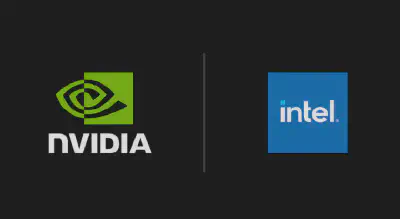Nvidia Will Contribute $5 Billion to Intel to Build Custom x86 Chip
Nvidia’s help could revitalize Intel and strengthen upcoming product lines.

By Megan Crouse

Nvidia will invest $5 billion in its competitor Intel to further intertwine Nvidia’s AI-boosting chips and Intel’s x86 architecture and CPUs. The companies will work together on several generations of data center and PC infrastructure, both companies announced on Thursday.
“This historic collaboration tightly couples Nvidia’s AI and accelerated computing stack with Intel’s CPUs and the vast x86 ecosystem — a fusion of two world-class platforms,” said Nvidia CEO Jensen Huang in a press release.
Intel will make x86 SOCs designed to connect to Nvidia chiplets
Intel’s x86 architecture is at the heart of many CPUs. Now, Intel will build custom x86 system-on-chips designs specifically to enable easy integration with Nvidia RTX GPU chiplets. The SOCs will be placed inside PCs data centers running Nvidia’s high-end CPUs and GPUs to accelerate AI processes. Intel will also build NVIDIA-custom x86 CPUs for data centers. The Nvidia and Intel architectures will be connected using Nvidia’s NVLink interconnect.
Nvidia will invest $5 billion in Intel’s common stock at a purchase price of $23.28 per share, subject to regulatory approval. That’s about 7% less than Intel’s closing stock price on Wednesday.
How this Intel-Nvidia deal could benefit both companies
For Nvidia, acquiring a stake in Intel could give Nvidia strategic influence over the AI infrastructure tech stack. Nvidia has reached into nearly every aspect of generative AI inference, training, and acceleration, and earlier became the most valuable company as GPUs proved critical for advanced generative AI.
For Intel, the capital strengthens its balance sheet. Intel has received injections of cash from other entities recently. Japanese holding company SoftBank contributed $2 billion to Intel in August. The U.S. government took a roughly 10% stake in Intel later in August, in an unusual deal that saw the government reallocate existing grant programs.
“Intel’s leading data center and client computing platforms, combined with our process technology, manufacturing and advanced packaging capabilities, will complement Nvidia’s AI and accelerated computing leadership to enable new breakthroughs for the industry,” said Lip-Bu Tan, chief executive officer of Intel, in the press release.
Intel is not faring well against major competitor Arm. In early 2025, Arm announced it would manufacture its own server CPUs, with manufacturing handled by foundries such as TSMC, while continuing to license its semiconductor designs to other companies.
Intel’s manufacturing side faces stiff competition. Many potential customers, such as Apple, have chosen Taiwan Semiconductor Manufacturing Company instead. Nvidia and Intel have not announced any foundry or manufacturing commitment as part of the deal.
At a press conference on Thursday, Jensen and Tan steered questions about the Intel foundry back to the product announcements. Jensen noted that Nvidia will become a customer for Intel’s x86.
“In the future, we will buy x86 CPUs from Intel and fuse it with our rack scale system,” he said.
At the same time, “we’re both very successful customers of TSMC’s,” Jensen said.
The deal had been in progress for over a year, Huang and Tan said, meaning the plan was put into place well before Nvidia’s current geopolitical woes. The deal doesn’t seem to have been struck due to any strategy related to sales in China or the significant role President Donald Trump’s administration plays in the tech industry, either. However, the move might prove prescient in the long run.
“This investment essentially gives NVIDIA three critical advantages,” said David Bader, Distinguished Professor and Director of the Institute for Data Science at New Jersey Institute of Technology, in an email to TechRepublic. “First, priority access to Intel’s foundry capacity when they need it most; second, influence over Intel’s roadmap and manufacturing priorities; and third, a viable U.S.-based alternative that reduces their Taiwan exposure. It’s not about Intel being the best option—it’s about Intel being the only credible domestic option.”
https://www.techrepublic.com/article/news-nvidia-intel-deal/